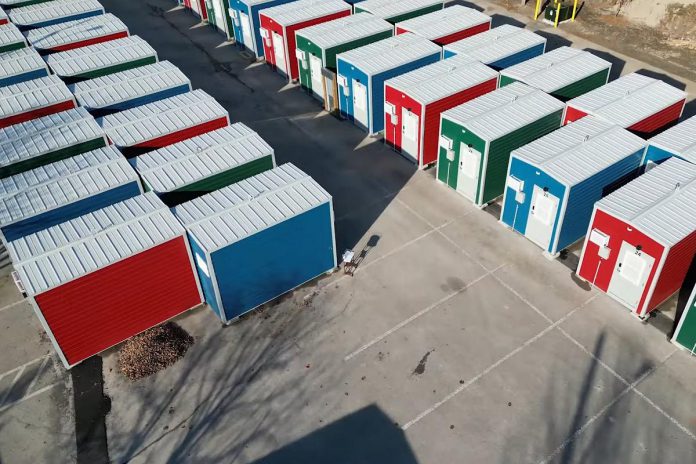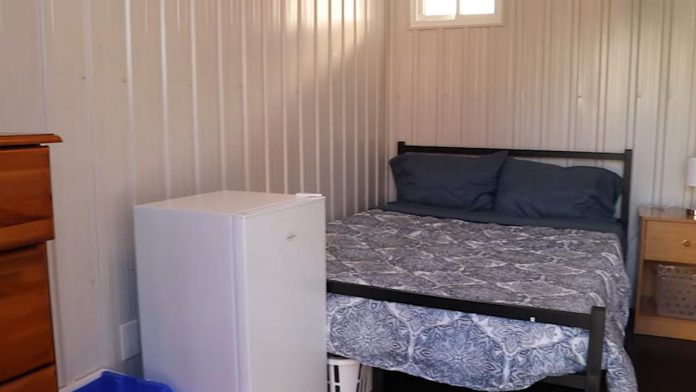
Peterborough city council will be asked to approve an extension in funding and an expansion in size of the modular bridge housing community (MBHC) program at Wolfe Street in downtown Peterborough.
A report from community services commissioner Sheldon Laidman to be presented at city council’s general committee meeting on Monday (September 16) recommends the city continue to support the program beyond November 30, 2025, and that up to 16 more modular cabins be installed at the location at a cost of up to $1.12 million.
The report also recommends that the MBHC program remain located at Wolfe Street beyond November 2025, as long as the location is not needed for other city activities or services and as long as funding under the Ontario government’s homelessness prevention program remains at its current level.
In May 2023, city council approved the MBHC program to operate for 18 to 24 months as a measure to provide supported temporary housing options for people experiencing homelessness, largely in response to a controversial tent encampment at the Wolfe Street/Rehill Lot. By fall 2023, the city had constructed 50 modular homes, shared washroom facilities, and a central service hub operated by the Elizabeth Fry Society with 24/7 services and staff support on site.
“The initial program impacts and preliminary evaluation data from the MBHC program indicate that the program is making significant strides in stabilizing residents’ lives and positively impacting the surrounding community,” the report reads. “The data is showing that there are improvements in resident stability, successful transitions to permanent housing, and residents making progress on goals and employment, all suggesting the program’s effectiveness.”
“The MBHC has also addressed a critical gap in the local housing system by providing a transitional housing opportunity for chronically unhoused, higher acuity individuals to help individuals to integrate into the local housing continuum. Additionally, the program has contributed to a safer and more positive neighbourhood environment, evidenced by a decrease in police calls and favorable community feedback. While challenges remain, particularly in meeting the broader demand for housing, the MBHC is a successful intervention that continues to evolve and adapt to meet the needs of its residents and the community.”

When city council approved the program in May 2023, council also directed city staff to explore alternative locations for modular housing, including both municipally and privately owned sites. While city staff have determined there are 12 city-owned properties that have the basic requirement to support the MBHC program, the report recommends it remain at the Wolfe Street location.
According to the report, it would cost at least $1.68 million to relocate the MBHC to a different site, with additional expenses possible depending on the new site. The current funding under the provincial homelessness prevention program would not be sufficient to cover the cost of moving the program.
In addition to potential costs, the report notes other reasons against moving the program to another location, including minimizing disruptions to the residents at the current location and potential challenges in replicating operational procedures and processes at a different site.
“Staff have not identified any reasons to expect the site would function better in a different location,” the report states.
The report also notes risks in moving the MBHC program to another location. Not all existing residents may want move to a different location, and converting the existing location back to a parking lot may result in a return to its use as a tent encampment.
Even if council decides to proceed to another location, the report states, an extension to the MBHC program at Wolfe Street would be required until summer 2026 if the new location is on city-owned property, and to summer 2027 if the new location is on privately owned property.
Should the MBHC program remain at Wolfe Street, the report recommends an expansion of the program with up to 16 additional modular cabins, at a cost of $1.12 million with funding coming from the city’s social services reserve.
“Staff have done an evaluation of the site and have determined that up to 16 additional cabins could be placed on the site within the planning limitations of the site,” the report states. “This would be a one-time capital purchase to expand the reach of the program by housing and providing supports to an additional 16 people. The cost to purchase and install each cabin is estimated at a price of $70,000 per cabin.”
Aside from the capital costs, the report states that expansion would depend on whether operating costs for the site can remain within the funding allocation under the provincial homelessness prevention program.
An additional $75,000 would come from the city’s social services reserve to enhance the site’s security infrastructure,
“If expansion is approved, staff would like to make some minor physical adjustments to the site, based on program evaluation after the last seven months,” the report states. “Staff are recommending that there be changes to the fence line and supporting security cameras to better support the program operations and physical site.”
In terms of community consultation, the Wolfe Street Neighbourhood Liaison Committee has met every one or two months since July 2023 to assess the impact of the MBHC program on the local community. According to the report’s appendix, members of the committee have reported “feeling safer and more positive about their community, noting a decrease in noise levels.” In addition, the appendix states, there has been “a noticeable decrease in police calls for service” since the MBHC program began.
In May, city staff distributed a survey to 85 residents, organizations, and businesses in the vicinity of Wolfe Street and received seven responses, with most respondents stating that the overall impact has been positive, with the neighbourhood being cleaner and having an “increased sense of safety.”
It should be noted, however, that the city has not yet consulted with surrounding residents and businesses about the proposed extension or expansion of the program.
“The continued engagement with the Wolfe Street community and stakeholders will be essential to maintaining the program’s effectiveness and addressing any emerging concerns as the project progresses,” the report states.
Items endorsed by general committee on September 16 will be considered by council for final approval the following Monday (September 23), when public delegations will be heard.
Council meetings are streamed live at www.peterborough.ca.


























